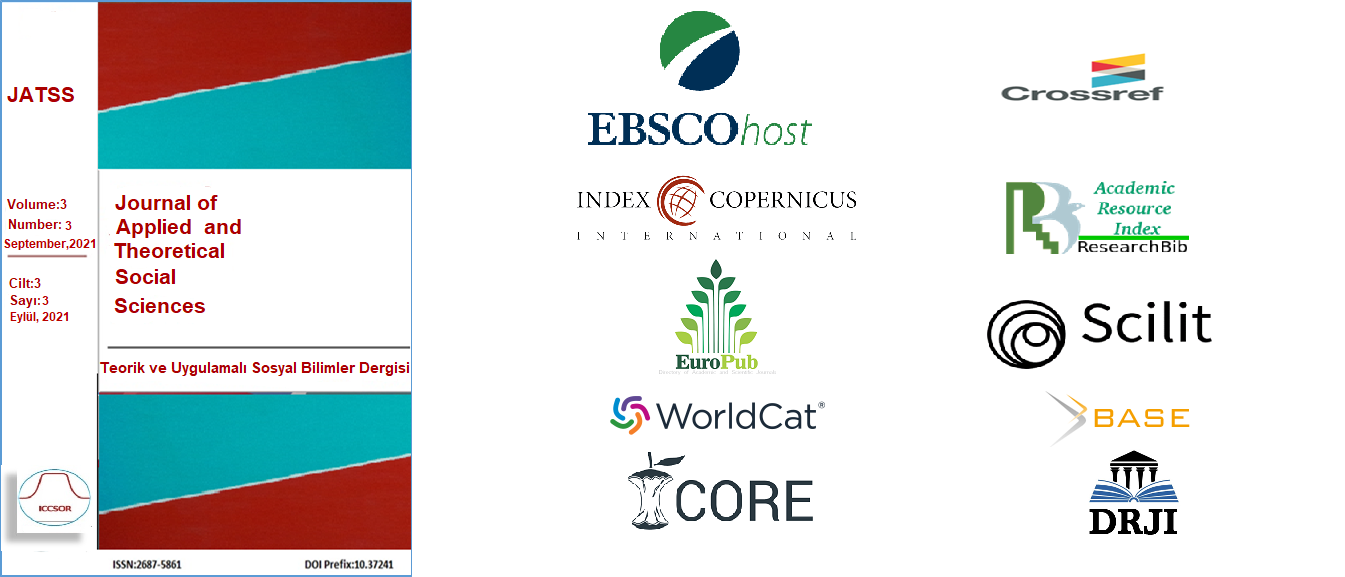Governance and Economic Evaluation of Governance: Turkey’s Good Governance Indicators
Abstract
Today, although governance is important for every country, it is of great importance in solving economic and social problems especially in developing countries. Many studies in the literature reveal that the understanding of governance affects the economic performance of countries positively. In this context, it is possible to evaluate countries comparatively by considering the effects of their governance quality on national economies. In this study, it is aimed to emphasize that the countries that are in a good position in terms of governance indicators are generally more successful in sustainable economic growth and development, and it has been tried to show that institutional differences are effective on the development gap between countries. In this study, the role of governance on economic growth and development was discussed and comparisons were made between Turkey and G7 countries based on the governance indicators in The Worldwide Governance Indicators (WGI) of the World Bank and economic performance data obtained from the World Bank. Governance indicators and macroeconomic data obtained from the World Bank are tabulated and the current situation of Turkey and G7 countries is interpreted. Significant differences were observed in the comparisons made. G7 countries have high scoring governance indicators that can produce positive economic results. On the other hand, Turkey's economic and governance indicators lag behind the averages of developed countries.
Metrics
References
Acemoglu, D., Robinson, J. A. (2013). Ulusların Düşüşü, 1. Baskı, Doğan Egmont Yay., İstanbul. 353
Ağazade S., Artan S., Hayaloğlu P. (2020). Kurumsal Gelişme Ve İktisadi Büyüme: Doğu Avrupa Geçiş Ekonomileri Örneği Yıl: 10 Sayı: 20
Artan S., Hayaloğlu P. (2014). Kurumsal Yapı ve İktisadi Büyüme İlişkisi: Türkiye Örneği DOI: https://doi.org/10.17233/se.65623
Bayramoğlu, S. (2005) “Yönetişim Zihniyeti: Türkiye’de Üst Kurullar ve Siyasal İktidarın Dönüşümü”. İletişim Yayınları, İstanbul
Çütcü, İ. Ve Bozan T. (2019). İnovasyon ve Ekonomik Büyüme İlişkisi: G7 Ülkeleri Üzerine Panel Veri Analizi 289-310 DOI: https://doi.org/10.29216/ueip.607662
Doğan, K. C. (2016). Küreselleşme Ve Neo-Liberal Kuşaklar Çerçevesinde Devleti Konumlandırma Sorunsalı: “Minimal Devlet’ten Düzenleyici Devlet’e” Cilt: 9 Sayı: 43 DOI: https://doi.org/10.17719/jisr.20164317748
Dokuzuncu Kalkınma Planı (2007). Kamuda İyi Yönetişim Özel İhtisas Komisyonu Raporu. DPT Yayın No. 2721
Dünya Ekonomik Forumu, World Economic Forum (WEF), (2019). The Global The Global Competitiveness Report- Index 4.0
Güney, T. (2017). Hükümet Etkinliği Ve Ekonomik Büyüme İlişkisi. Cilt: 5, Sayı: 4, 42-55. DOI: https://doi.org/10.18825/iremjournal.335671
Güzelsarı, S. (2003). Neo-Liberal Politikalar Ve Yönetişim Modeli. Amme İdaresi Dergisi, Cilt 36 Sayı 1, s. 17-34
Güzel, S. Ve Murat, D. (2019). Yönetişim Ve Ekonomik Performans Bağlamında OECD Ülkelerinin Konumları. Akademik İncelemeler Dergisi, 14 (1), 315-344 DOI: https://doi.org/10.17550/akademikincelemeler.466146
Kalfa, C. Ve Ataay, F. (2008). Yönetişim: Devlet-Toplum İlişkilerinde Yeni Bir Aşama. Ç.Ü. Sosyal Bilimler Enstitüsü Dergisi, Cilt: 17, Sayı: 3, 229-240
Karagül, M. (2001). Ekonomik İstikrarsızlığın Ekonomik ve Ekonomik Olmayan Nedenleri ile Çözüm Arayışları, Yönetim ve Ekonomi, Cilt: 7, Sayı: 1, 187-195
Kaufmann, Daniel and Kraay, Aart and Mastruzzi, Massimo, (2010). The Worldwide Governance Indicators: Methodology and Analytical Issues World Bank Policy Research Working Paper No. 5430
Kaufmann, D. ve Kraay, A. (2002). Growth Without Governance, Policy Research DOI: https://doi.org/10.1353/eco.2002.0016
Working Paper, No. 2928, Development Research Group.
Kaya Kanlı, N. ve Aydoğuş, O. (2017). Ülke Risk Faktörlerinin Doğrudan Yabancı Yatırımlar Üzerindeki Belirleyici Etkisi, Cilt: 17, Sayı: 2
Konak, A . (2020). G-7 Ülkelerinde İhracatın Ekonomik Büyüme Üzerindeki Etkisi: Panel Nedensellik Analizi. Bartın Üniversitesi İktisadi Ve İdari Bilimler Fakültesi Dergisi, 11 (21), 232-251.
Mauro, P. (1995). Corruption and Growth. The Quarterly Journal of Economic DOI: https://doi.org/10.2307/2946696
Alagöz, M. (2004). SÜRDÜRÜLEBİLİR KALKINMANIN PARADİGMASI.. Sosyal Ekonomik Araştırmalar Dergisi 4 (8), 1-23
North, Douglass. (1990). “Institutions, Institutional Change, and Economic Performance, Cambridge University Press. DOI: https://doi.org/10.1017/CBO9780511808678
North, Douglass, (1991). "Institutions." Journal of Economic Perspectives DOI: https://doi.org/10.1257/jep.5.1.97
Özer, M.A. (2006). Yönetişim Üzerine Notlar, Sayıştay Dergisi, Sayı: 63, 79-81
Özdemir D., İmamoğlu İ. K. (2015). Yönetişim Göstergeleri Ve Büyüme: Gelişmiş Ve Gelişmekte Olan G20 Ülkeleri İçin Bir Nedensellik Analizi Uluslararası Ekonomi, İşletme Ve Politika Dergisi, 5 (1), 113-135
Rodrik, D. (2000). “Savings Transitions,” The World Bank Economic Review DOI: https://doi.org/10.1093/wber/14.3.481
Sever, E. ve İğdeli, A. (2015). Enflasyon Hedeflemesi ve Ekonomik Performans İlişkisi: Türkiye Örneği. Aksaray Üniversitesi İktisadi ve İdari Bilimler Fakültesi Dergisi, 7(2), 33-42
Şeker, A. (2019). Teknolojik Gelişme ve Yüksek Teknoloji İhracatının Ekonomik Karmaşıklık Endeksi Üzerindeki Etkisi: Türkiye Örneği. Cilt:26, Sayı:2 DOI: https://doi.org/10.18657/yonveek.581397
TBB. (2002). Şeffaflığın Önemi Üzerine Bir Değerlendirme. Bankacılık ve Araştırma Grubu Yayını.
TBMM, Tutanak Dergisi, Dönem: 22, Yasama Yılı: 2, “Kamu Yönetimi Temel Kanunu Tasarısı ile İçişleri, Plan ve Bütçe ve Anayasa Komisyonları Raporları”
TESEV (2008). İyi Yönetişim El Kitabı, Tesev Yayınları, İstanbul.
Tezer, H. (2020). Uluslararası Sermaye Hareketlerinin Türkiye Ekonomisi Üzerindeki Makroekonomik Etkisinin İncelenmesi (2008-2018). Atatürk Üniversitesi Sosyal Bilimler Enstitüsü Dergisi, 24 (2), 831-859.
The World Bank, (2019). Inflation, Consumer Prices
https://data.worldbank.org/indicator/FP.CPI.TOTL.ZG
The World Bank, (2019). GDP Per Capita,
https://data.worldbank.org/indicator/NY.GDP.PCAP.CD
The World Bank, (2021). The Worldwide Governance Indicators http://info.worldbank.org/governance/wgi/#reports
Türker, O. (2018). Kamu Harcamalarının Dış Ticaret Üzerindeki Etkisi: G-7 Ülkeleri Örneği. Sosyal Bilimler Dergisi, Sayı: 27, 141-156 DOI: https://doi.org/10.16990/SOBIDER.4454
United Nations Conference on Trade and Development (UNCTD), (2020). World Investment Report
United Nations Development Programme, (1997). Reconceptualising Governance. Discussion Paper 2, New York: Management Development and Governance Division., Aktaran: Aktan, Coşkun Can, "İdeal Devlet ve İyi Yönetim: Temel İlkeler, Kurallar ve Kurumlar" Hukuk ve İktisat Araştırmaları Dergisi, Cilt: 7, Sayı: 1, 2015, s. 55
World Bank, (1992). Governance: The World Bank’s Experience, Washington DC. World Bank Publ., Aktaran: Aktan, Coşkun Can, "İdeal Devlet ve İyi Yönetim: Temel İlkeler, Kurallar ve Kurumlar" Hukuk ve İktisat Araştırmaları Dergisi, Cilt: 7, Sayı: 1, 2015, s. 56
World Bank, (1989). Sub-Saharan Africa: From Crisis to Sustainable Growth, World Bank, Washington DC.
Zafir C. Z. (2009). Neoliberalizmin Minimal Devlet Yaklaşımına Bir Eleştiri. Yönetim Bilimleri Dergisi






















